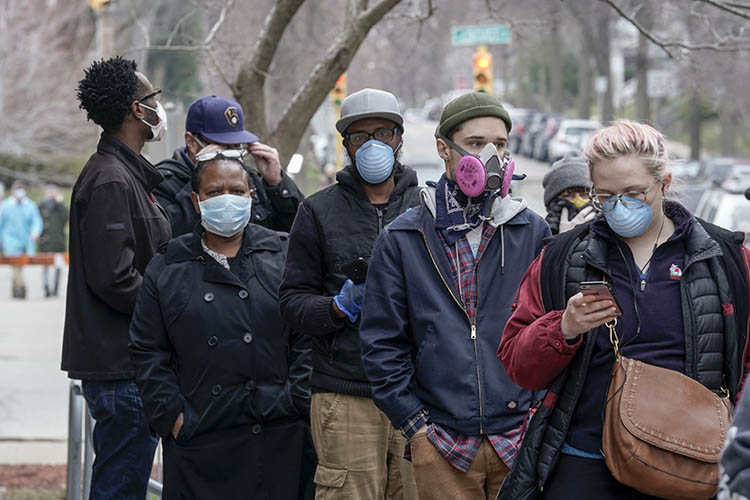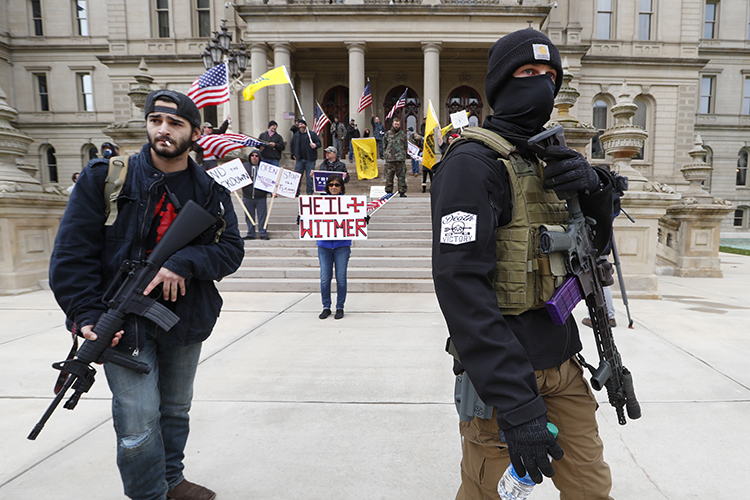Election 2020: The pandemic changes everything

The streets are largely empty. People are secluded in their homes, forced to seek haven from a deadly virus. With shops, factories and offices closed, the economy is tottering. Voters arrive in protective masks to cast primary election ballots, while other primaries have been postponed or canceled. Protesters, meanwhile, gather at state capitols, demanding a return to normalcy — and some of them are armed.
Two months after the first reported U.S. death from COVID-19, the scenes are still startling, like a vision of dystopia come to life. Just as the crisis is raising risks in day-to-day life at home and at work for hundreds of millions of Americans, Berkeley scholars say it already has put an indelible stamp on the 2020 election, now less than seven months away.
In a series of interviews, they predicted that the pandemic is likely to be the overarching issue of the campaign, eclipsing other profound issues in recent years. And, they said, that will likely bring a related issue front and center: the economic vulnerability of the middle class and the working poor, including many people of color.
President Donald Trump “was planning his campaign as a referendum on the number of new jobs that have been created” during his first term, said Eric Schickler, co-director of the UC Berkeley Institute of Governmental Studies. “But the election has been completely transformed. Now the question is going to be both about blame for the economy and blame for the response to the pandemic — and about what do you do to recover.”
“We’re at an unemployment rate of 20%, or higher,” said Jane McAlevey, a senior policy fellow at the UC Berkeley Center for Labor Research and Education. “There’s been massive economic dislocation. … I think the effect is going to be huge.”
Insights from the Berkeley scholars, taken together, suggest the 2020 campaign will be an electoral event unlike any in the nation’s history. If candidates and campaign workers can’t go into the field, they said, it will change how they communicate and get out the vote. If voters can’t go to the polls without risking their health, then political and legal fights over voting by mail, already intense, will escalate.
“The pandemic is deepening the conflict between two very different world views and, in some ways, making each stronger,” said Ian Haney López, the Chief Justice Earl Warren Professor of Public Law at Berkeley Law. “One world view says we’re isolated and under threat, and the other says we need each other.”
Unless such issues of communication, polarization and voter suppression are managed with care on all sides, the Berkeley scholars said, they could provoke dangerous conflicts over the legitimacy of the election results.
Americans living on the edge
Even before the current crisis, the political discussion in the United States had turned to the growing wealth chasm between the top 1% and everyone else.
Consider: Median household wealth in 2016 was slightly lower, adjusted for inflation, than in 1983. The average wealth of the top 1% more than doubled in that span.
Berkeley economist Gabriel Zucman wrote in 2019 that the 400 richest Americans had tripled their share of the nation’s wealth since the early 1980s.
Trump’s 2016 campaign acknowledged the frustration and desperation of working Americans, and he promised to look out for them. Following 15 years of wage stagnation, the median U.S. household income rose an average 2.1% per year from 2015 to 2018.
Then came the coronavirus, and an abrupt contraction of the economy. In the span of a few weeks, 26.5 million Americans have filed for unemployment. At no time in memory have the health and economic well-being of so many Americans been so uncertain.
In these tragic circumstances, a new focus has come to the plight of Americans who live paycheck to paycheck, often without health insurance: farm and meat-plant workers, child daycare workers, shop owners, barbers and beauticians, workers in hotels, restaurants and retail stores. While millions of Americans in higher economic brackets can work from home, the working poor and middle class typically can’t.
McAlevey, an author and experienced labor organizer, predicted that in the coming campaign, these workers will be symbols of the struggles that confront the average American. She predicted that nurses and doctors also will play a role in that narrative.
“Hundreds of thousands of American health care workers are being forced to work in the COVID conditions with no personal protective equipment whatsoever,” she said. “They themselves are dying on the frontlines of the crisis. … The political dynamic is changing very, very fast — they will be at the front and center, setting a different kind of tone for this election.”
The nexus of class, race and gender
In the 2016 election, Trump’s appeal focused especially on the white working class, subtly and sometimes overtly appealing to racial and ethnic identity. This year, Berkeley experts said, the pandemic will focus the campaign on issues at the intersection of class, race and gender.
A number of reports have found that the virus has disproportionately affected the health of black people. And economic equity for workers in fields such as education and health care is inseparable from racial and gender equity. “Those are sectors that are overwhelmingly women and women of color,” McAlevey explained.
These issues almost certainly will play out in the campaign. Haney López has written extensively on “dog-whistle” racial appeals and political communication. He has described how coded racial appeals can reinforce support for a candidate — but, he said, the dynamic is often complex.
This year, the president and his allies have cast the coronavirus as the “China virus”, and they have used the pandemic to justify building a wall at the U.S.-Mexico border. Last week, the administration temporarily banned immigration.
And yet, said Haney López, voters may see common sense in those positions. If they’re accused of bigotry, many react with hostility.
The challenge for campaign strategy? Democratic presidential candidate Joe Biden “should not answer Trump’s race-baiting by calling him a bigot or a xenophobe,” Haney López said. “He needs to call out that baiting not as a symptom of Trump’s bigotry, but as an example of Trump’s divide-and-conquer strategy.”

The emerging fight over vote-by-mail
As the April 7 primary election neared, Republicans in Wisconsin mounted a political and legal fight to block an extension of absentee balloting. The U.S. Supreme Court sided with them, and thousands of the state’s voters turned out in person and waited for hours in line, some wearing masks and other protective gear.
But the issue remains unresolved: If social distancing is still required in November, how will people vote without risking their health? Casting and counting votes — normally a routine administrative process — now threatens to become a political and legal fight that shapes the campaign.
By some accounts, the pandemic could accelerate a move toward online voting. But Berkeley political scientist Steven Weber, faculty director of the Center for Long-Term Cybersecurity, called that unrealistic.
“We can’t even secure internet-connected voting machines,” Weber said. With less than seven months until November, “imagine trying to put an app on everyone’s phone or computer in the almost infinite permutations of phone models and kinds of software, and different operating systems. … Online voting is just not ready for prime time.”
Other options? “We need to focus on vote-by-mail — right now,” said political scientist Henry Brady, dean of the Goldman School of Public Policy.
Five states already conduct voting fully by mail. Red states, blue states, purple states — California among them — have broad experience with giving voters the mail option. And while all voting systems are vulnerable, Weber says, voting by mail is generally resistant to the scale of fraud that can change an election.
“With paper ballots,” he explained, “you could only change one at a time, or you can only steal a certain number of them, or divert a certain number of them from one post office or another.”
Still, many Republicans object, citing security concerns. Democrats see that as a strategy for vote-suppression — and Trump and some allies have essentially confirmed their suspicion. “If you ever agreed to it,” the president said recently, “you’d never have a Republican elected in this country again.”
Popular wisdom holds that mail-in voting encourages more Democratic voters, but according to Brady and other Berkeley scholars, the research doesn’t support it.
Assuring the legitimacy of election results
Embedded in the fight over fair and secure voting on November 3 is a profound question about November 4: Will polarization around that issue lead the losing side to reject the legitimacy of the outcome?
Trump, Biden and other political leaders can help avert such a risk, said David Broockman, an associate professor of political science. Most people base their political opinions on cues from their preferred political leaders, and they’re unlikely to shift unless their leaders shift.
In the too-close-to-call 2000 election, he said, Democrat Al Gore yielded to Republican George W. Bush rather than pursue a long, divisive effort to claim victory. But 2020 is a different world.
“What concerns me,” Broockman said, “is that, because this norm has been eroding among elites, they might not call the election results legitimate in a way that allows us to move on. That could open up the possibility for some real, real problems.”
